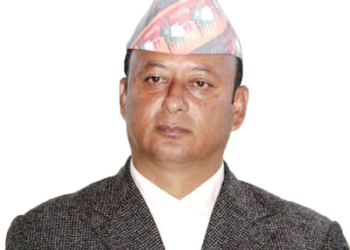In a poignant revelation, Raj Kishore Yadav, the prominent leader of the Janata Samajwadi Party (JSP), painted a disheartening picture of Nepal’s development, describing it as moving at a sluggish pace.
The leader, disenchanted and embittered, reflected on a biting comment from an Indian businessman who dismissed Nepali leaders as mere “big talkers and not doers.”
Yadav takes us back to the year 2008, a time filled with hope and fervor following the Constituent Assembly election.
He, along with other vibrant leaders such as Gagan Thapa from the Nepali Congress and Rabindra Adhikari from CPN-UML, embarked on a journey to New Delhi.
In an interaction with an Indian hydro expert, they passionately extolled Nepal’s hydropower potential, boldly proclaiming their vision to make Nepal prosperous by selling electricity within the next few years.
However, the tide of enthusiasm quickly receded when the Indian expert, with a hint of derision, reminded them of a similar promise made by a “young” Sher Bahadur Deuba, who, at the time, held the position of Prime Minister 17 years prior.
The Indian expert delivered a harsh reality check, stating, “Even if your sons come after 20 years, they will echo the same old story. You Nepalis excel at talking, but where is the action? When will you turn your dreams into reality?”
In a startling revelation, the Indian expert recounted a chilling encounter with a “young Sher Bahadur Deuba” in the bustling heart of New Delhi.
The revelation pierced through the air, disclosing that Deuba, in his youthful exuberance, had echoed an eerily identical answer to the persistent question regarding harnessing Nepal’s hydro potential for national prosperity.
The poignant disparity between vision and reality is exemplified by the elusive Melamchi water, a pledge made by Krishna Prasad Bhattarai in 1994 that remains unfulfilled even after three decades.
Astonishingly, the same vision for Nepal’s prosperity through hydro power had been passionately expressed by Deuba.
This haunting encounter serves as a stark reminder of Nepal’s unfulfilled aspirations, where grandiose promises and ambitious declarations seem to dissolve into the harsh reality of stagnation.
As the nation grapples with the echoes of broken dreams, the question lingers: When will Nepal break free from the shackles of rhetoric and truly pave the way for a future it once fervently envisioned?
As the weight of this revelation hangs in the air, the question looms large: Has Raj Kishore Yadav and his contemporaries, including Gagan Thapa, truly grasped the “sense of responsibility” advised by the sagacious Indian expert?
The people of Nepal, wearied and disillusioned, find themselves not only accustomed to such speeches and hollow promises but utterly fed up with the ceaseless cascade of political slogans, grandiose talks of development, and promises of progress and prosperity.
In this landscape of unfulfilled pledges, leaders persistently invent new jargons, manipulating the sentiments of the Nepali people solely to clutch onto power and fulfill their vested interests.
The relentless cycle of unmet promises continues to play out against the backdrop of a nation yearning for substantive change.
Transporting ourselves back to the tumultuous year of 1991, just after the restoration of democracy in 1990, the then Prime Minister of the Interim Government, Krishna Prasad Bhattarai, stood at the precipice of lofty ambitions.
Amidst fervent declarations, Bhattarai, along with other leaders, vowed to transform Nepal into a Singapore in a mere five years.
Yet, from that very same podium, other leaders dared to dream even bigger, pledging to mold Nepal into another Switzerland within the next decade.
As we navigate through this tumultuous journey of promises and disillusionments, the echoes of past declarations serve as a haunting reminder of the persistent chasm between rhetoric and reality, leaving the people of Nepal yearning for a future that transcends the hollow echoes of bygone pledges.
In the tapestry of Nepal’s history, the juxtaposition of promises made and dreams shattered is glaring.
As other South Asian nations surge ahead, Nepal lags behind. Bhutan, with a GDP of US$236 in 1991, has soared to approximately 9 billion by the end of 2023.
The poignant disparity between vision and reality is exemplified by the elusive Melamchi water, a pledge made by Krishna Prasad Bhattarai in 1994 that remains unfulfilled even after three decades.
This grim reality underscores a disheartening truth – political parties and leaders tread on precarious ground, driven more by a hunger for personal wealth than the welfare of the people.
As they amass fortunes for themselves and elevate the living standards of their kin, the basic concerns of the populace – health, education, drinking water, electricity, and justice – are relegated to the shadows.
The disconnection between political leaders and the electorate deepens as they continue to peddle grand illusions.
A contemporary example is CPN-UML Chairman KP Oli, who, in the grandeur of his rhetoric, envisions operating Nepal’s ship in the Pacific and Indian Ocean, importing trains from China, and laying gas pipes in households.
Yet, the hollowness of these promises echoes loud, signaling a stark departure from reality.
Raj Kishore Yadav, a voice of reason, unveils the glaring truth that mere rhetoric without tangible action is a futile endeavor.
He urges a paradigm shift, an embrace of a forward-looking and progressive approach to tackle the pressing challenges confronting Nepal.
To confront the challenges ahead, a clarion call for honesty and transparency reverberates, urging leaders, experts, and intellectuals to step forward, share insights openly, and contribute to the formulation of effective policies.
This clarion call resonates with the dire need for substantive efforts and effective implementation to metamorphose aspirations into reality.
Yadav, echoing the warnings of the Indian expert from 2008, emphasizes that lofty ambitions require concrete actions.
The failure in diplomacy, an extension of a nation’s internal capacity, further accentuates the leadership vacuum.
Bureaucratic dominance prevails over political guidance, hindering Nepal’s diplomatic evolution.
As other South Asian nations, including Bhutan and Bangladesh surge ahead, Nepal lags behind.
In the face of this stark reality, the pertinent question looms large – are Nepal’s political leaders cognizant of the fact that loading people’s minds with false promises won’t usher in prosperity?
To confront the challenges ahead, a clarion call for honesty and transparency reverberates, urging leaders, experts, and intellectuals to step forward, share insights openly, and contribute to the formulation of effective policies.
The time for change is not merely a suggestion but an urgent necessity.









Comment